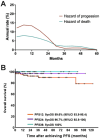PFS24 as a prognostic milestone in patients with newly diagnosed primary CNS lymphoma
- PMID: 40275355
- PMCID: PMC12023625
- DOI: 10.1186/s13045-025-01700-7
PFS24 as a prognostic milestone in patients with newly diagnosed primary CNS lymphoma
Abstract
High-dose chemotherapy followed by autologous hematopoietic stem cell transplantation has significantly improved overall survival (OS) in primary central nervous system lymphoma (PCNSL). However, early identification of long-term survivors remains a challenge. Progression-free survival at 24 months (PFS24) has emerged as a key prognostic marker in diffuse large B-cell lymphoma, but its relevance in PCNSL is still unclear. In this retrospective multicenter study, we analyzed data from 146 newly diagnosed, transplant-eligible PCNSL patients treated with MATRix-like regimens across 14 hospitals. With a median follow-up of 48 months, the 2-year PFS and OS rates were 50.4% and 65.6%, respectively. Of the 139 patients evaluable for PFS24-analysis, 51.1% reached PFS24, with a subsequent 5-year OS of 96.7%. Of note, the annual hazard rate for progression and death decreased to under 5% after 24 months, remaining stable thereafter. The patients who failed to reach PFS24 had a median OS of only 6.0 months. Key predictors of PFS failure included impaired Karnofsky performance status and treatment dose-reduction. In conclusion, PFS24 was identified as an important prognostic marker in PCNSL. Patients who achieve PFS24 have a favorable prognosis, whereas those who do not face poor outcomes and require innovative treatment approaches. This insight could aid in risk stratification and support the use of PFS24 as a surrogate endpoint in clinical trials.
Keywords: Overall survival; PFS24; Primary CNS lymphoma.
© 2025. The Author(s).
Conflict of interest statement
Declarations. Ethical approval: All procedures were performed in accordance with the general ethical principles outlined in the Declaration of Helsinki. The study was carried out after approval of the Medical Faculty of the Otto von Guericke University Magdeburg, Magdeburg, Germany (approval no. 18/22). Consent for publication: Not applicable. Competing interests: The authors declare no competing interests.
Figures
References
-
- Ferreri AJM, Cwynarski K, Pulczynski E, et al. Long-term efficacy, safety and neurotolerability of matrix regimen followed by autologous transplant in primary CNS lymphoma: 7-year results of the IELSG32 randomized trial. Leukemia. 2022;36(7):1870–8. 10.1038/s41375-022-01582-5. - PubMed
-
- Houillier C, Dureau S, Taillandier L, et al. Radiotherapy or autologous Stem-Cell transplantation for primary CNS lymphoma in patients age 60 years and younger: Long-Term results of the randomized phase II PRECIS study. J Clin Oncology: Official J Am Soc Clin Oncol. 2022;40(32):3692–8. 10.1200/JCO.22.00491. - PubMed
-
- Illerhaus G, Ferreri AJ, Binder M, et al. Effects on survival of Non-Myeloablative chemoimmunotherapy compared to High-Dose chemotherapy followed by autologous stem cell transplantation (HDC-ASCT) as consolidation therapy in patients with primary CNS Lymphoma - Results of an international randomized phase III trial (MATRix/IELSG43). Blood. 2022;140(Supplement 2):LBA–3. 10.1182/blood-2022-171733.
-
- Maurer MJ, Habermann TM, Shi Q, et al. Progression-free survival at 24 months (PFS24) and subsequent outcome for patients with diffuse large B-cell lymphoma (DLBCL) enrolled on randomized clinical trials. Annals Oncology: Official J Eur Soc Med Oncol. 2018;29(8):1822–7. 10.1093/annonc/mdy203. - PMC - PubMed
-
- Casulo C, Byrtek M, Dawson KL, et al. Early relapse of follicular lymphoma after rituximab plus cyclophosphamide, doxorubicin, vincristine, and prednisone defines patients at high risk for death: an analysis from the National lymphocare study. J Clin Oncology: Official J Am Soc Clin Oncol. 2015;33(23):2516–22. 10.1200/JCO.2014.59.7534. - PMC - PubMed
Publication types
MeSH terms
LinkOut - more resources
Full Text Sources
Medical


